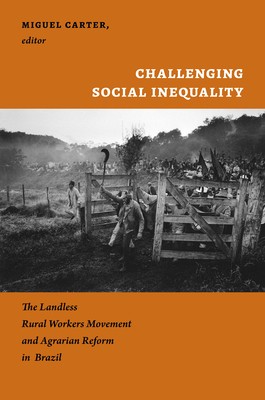
- We will send in 10–14 business days.
- Publisher: Duke University Press
- ISBN-10: 0822351862
- ISBN-13: 9780822351863
- Format: 15.5 x 22.6 x 2.8 cm, softcover
- Language: English
- SAVE -10% with code: EXTRA
Challenging Social Inequality (e-book) (used book) | bookbook.eu
Reviews
Description
In Challenging Social Inequality, an international and interdisciplinary group of scholars and development workers explores the causes, consequences, and contemporary reactions to Brazil's sharply unequal agrarian structure. They focus on the Landless Rural Workers Movement (MST)-Latin America's largest and most prominent social movement-and its ongoing efforts to confront historic patterns of inequality in the Brazilian countryside. Several essays provide essential historical background for understanding the MST. They examine Brazil's agrarian structure, state policies, and the formation of rural civil-society organizations. Other essays build on a frequently made distinction between the struggle for land and the struggle on the land. The first refers to the mobilization undertaken by landless peasants to demand government land redistribution. The struggle on the land takes place after the establishment of an official agricultural settlement. The main efforts during this phase are geared toward developing productive and meaningful rural communities. The last essays in the collection are wide-ranging analyses of the MST, which delve into the movement's relations with recent governments and its impact on other Brazilian social movements. In the conclusion, Miguel Carter appraises the future of agrarian reform in Brazil.
Contributors. José Batista Gonçalves Afonso, Sonia Maria P..P. Bergamasco, Sue Branford, Elena Calvo-González, Miguel Carter, Horacio Martins de Carvalho, Guilherme Costa Delgado, Bernardo Mançano Fernandes, Leonilde Sérvolo de Medeiros, George Mészáros, Luiz Antonio Norder, Gabriel Ondetti, Ivo Poletto, Marcelo Carvalho Rosa, Lygia Maria Sigaud, Emmanuel Wambergue, Wendy Wolford
EXTRA 10 % discount with code: EXTRA
The promotion ends in 10d.02:25:51
The discount code is valid when purchasing from 10 €. Discounts do not stack.
- Publisher: Duke University Press
- ISBN-10: 0822351862
- ISBN-13: 9780822351863
- Format: 15.5 x 22.6 x 2.8 cm, softcover
- Language: English English
In Challenging Social Inequality, an international and interdisciplinary group of scholars and development workers explores the causes, consequences, and contemporary reactions to Brazil's sharply unequal agrarian structure. They focus on the Landless Rural Workers Movement (MST)-Latin America's largest and most prominent social movement-and its ongoing efforts to confront historic patterns of inequality in the Brazilian countryside. Several essays provide essential historical background for understanding the MST. They examine Brazil's agrarian structure, state policies, and the formation of rural civil-society organizations. Other essays build on a frequently made distinction between the struggle for land and the struggle on the land. The first refers to the mobilization undertaken by landless peasants to demand government land redistribution. The struggle on the land takes place after the establishment of an official agricultural settlement. The main efforts during this phase are geared toward developing productive and meaningful rural communities. The last essays in the collection are wide-ranging analyses of the MST, which delve into the movement's relations with recent governments and its impact on other Brazilian social movements. In the conclusion, Miguel Carter appraises the future of agrarian reform in Brazil.
Contributors. José Batista Gonçalves Afonso, Sonia Maria P..P. Bergamasco, Sue Branford, Elena Calvo-González, Miguel Carter, Horacio Martins de Carvalho, Guilherme Costa Delgado, Bernardo Mançano Fernandes, Leonilde Sérvolo de Medeiros, George Mészáros, Luiz Antonio Norder, Gabriel Ondetti, Ivo Poletto, Marcelo Carvalho Rosa, Lygia Maria Sigaud, Emmanuel Wambergue, Wendy Wolford


Reviews